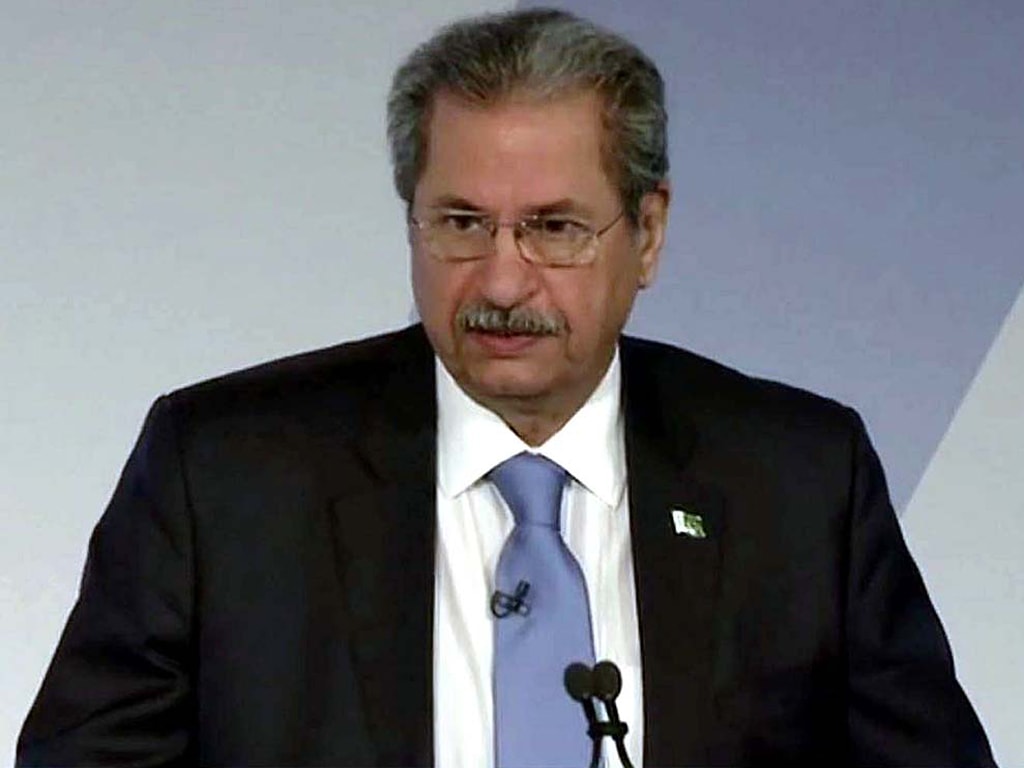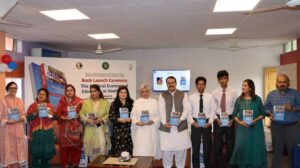ISLAMABAD: Federal Minister for Education and Professional Training Shafqat Mahmood Tuesday said the government is making conscious efforts to reduce the educational gaps and promote inclusion of using technology.
He was speaking as chief guest at the 2020, Global Education Monitoring (GEM) Report on inclusion and education, All means ALL, launched here at the Ministry of Federal Education and Professional Training.
Idara-e-Taleem-o-Aagahi (ITA) organized and co-hosted the national virtual launch of the UNESCO’s 2020, GEM Report along with Ministry for Federal Education and Professional Training, UNESCO Pakistan and Department for International Development (DFID).
The event called on all stakeholders to concentrate on those being left behind and move towards inclusion in education, particularly after COVID-19.
The education minister said the school closures following COVID-19 has disrupted the education system but it has allowed us to focus more on digital technologies.
He added that the findings from the 2020, GEM Report are beneficial and will help the government in formulating the education policy.
GEM Report Senior Analyst Anna Cristina D’Addio gave a presentation on the 2020, GEM Report and shared the key findings from the report.
The online event featured an interactive high-level panel that discussed the key messages and recommendations in the report.
“The GEM Report reminds us of the continued disparities in education, particularly in ensuring access of quality education to all, which is the foundation of inclusion,” UNESCO Pakistan Country Representative Patricia McPhillips said in her opening remarks.
“The GEM Report emphasizes the global need for better data collection and subsequent use,” she said, adding that it is encouraging to note that Pakistan’s inclusion-oriented data collection initiative is highlighted in the report as a best practice.
Recognizing the Transgender Persons (Protection of Rights) Act 2018 and introduction of admission quotas to Disability Act 2014, she said that these are important milestones for ensuring inclusive education.
Speaking at the event, DFID Pakistan Country Director Annabel Gerry said, “This report comes at a critical moment, where the coronavirus pandemic has added to the hidden emergency of exclusion from education.”
Since 2011, over 10 million children in primary school have benefited from UK support to government of Pakistan’s education reforms, of which 4.7 million are girls.
But significant inequalities remain by region, socioeconomic status, disability, religion and gender.
“I hope this report will catalyze the will and resources to realize inclusive and equitable quality education in Pakistan. No country can ever reach its full potential unless every one of its citizens can reach their full potential.
This is why we put inclusion at the heart of everything we do,” she added. Other panelists included Planning Commission of Pakistan’s Member Social Sector Dr Shabnum Sarfraz, Institute of Development and Economic Alternatives (IDEAS) Director and LUMS School of Education Interim Dean Dr Faisal Bari and Special Talent Exchange Program (STEP) Executive Director Muhammad Atif Sheikh.
ITA CEO Baela Raza Jamil called upon all the stakeholders to commit to the rights of all children regardless of their background, gender or ability.
The report provides an in-depth analysis of key factors for exclusion of learners in education systems worldwide including background, identity and ability and urges the countries to focus on those left behind as schools reopen so as to foster more resilient and equal societies.
The 2020, GEM Report notes that Pakistan is using positive, innovative approaches to transition to inclusion.
The country is testing a ‘third gender’ option in data collection tools while Pakistan’s Transgender Persons (Protection of Rights) Act 2018, prohibits discrimination in education and establishes their right to education and a 3% quota for transgender children in mainstream public and private education institutions.
Moreover, in 2019, Pakistan’s Government Rules and Disability Act 2014 introduced admission quotas for students with disabilities at all education levels.
Tertiary education institutions were asked to exempt candidates with disabilities from admission tests, relax age limits, provide fee concessions and offer appropriate examination modalities.
The 2020, GEM Report notes that 258 million children and youth were entirely excluded from education, with poverty as the main obstacle to access.
The Profiles Enhancing Education Reviews (PEER) introduced by GEM Report shows that many countries still practice education segregation, which reinforces stereotyping, discrimination and alienation.
Education Acts for all four provinces in Pakistan mention children with disabilities/special needs and lay down mechanism for educating CWDs in separate schooling system based on the National Policy for Persons with Disabilities 2002. But education policies vary in emphasis on inclusion.
In Punjab, under the 2012 inclusive education policy framework, students with mild and moderate disabilities are admitted to mainstream primary and lower secondary schools whose teachers are trained by master trainers of the Department of Special Education.
The report states that fewer than 10% of countries have laws that help ensure full inclusion in education while exclusion can be very blatant in some laws.
The Annual Status of Education Report (ASER) Pakistan survey, led by ITA, has included Washington Group’s Child Functioning Module to estimate the disability prevalence and educational status of children with disabilities in some regions of the country.




